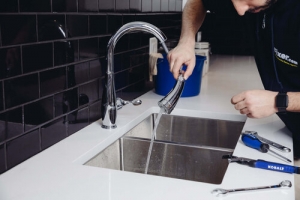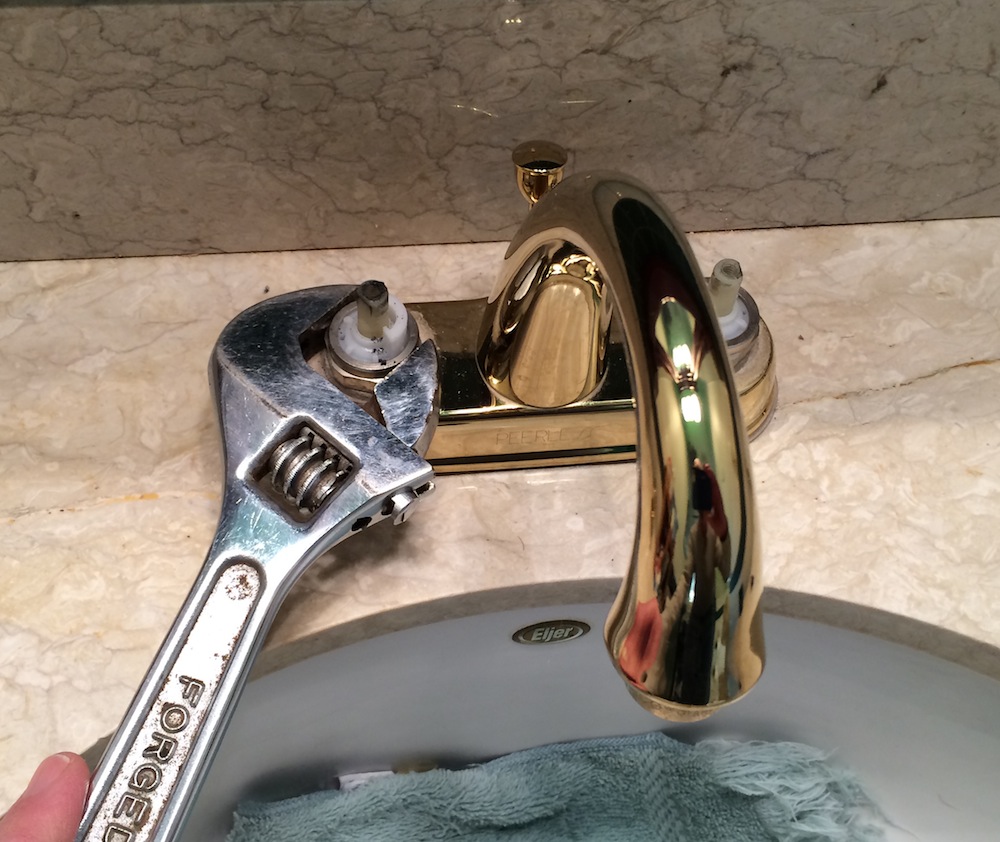Learning the Value of Resolving a Dripping Faucet
Learning the Value of Resolving a Dripping Faucet
Blog Article
Everybody maintains their unique conception involving Should I Repair or Replace a Leaky Faucet?.

Leaking faucets may feel like a small inconvenience, however their influence surpasses just the nuisance of the noise. From drainage to incurring unnecessary monetary expenses and wellness dangers, overlooking a dripping faucet can result in different repercussions. In this article, we'll delve into why it's crucial to resolve this common household problem quickly and efficiently.
Wastage of Water
Ecological Impact
Trickling faucets add significantly to water wastage. According to the Environmental Protection Agency (EPA), a solitary faucet dripping at one drip per second can waste greater than 3,000 gallons of water annually. This not just stress water resources but also impacts environments and wild animals dependent on them.
Financial Expenses
Raised Water Bills
Beyond the ecological impact, dripping taps can pump up water bills significantly. The built up wastefulness over time converts into higher energy costs, which can have been stayed clear of with timely repair services.
Potential Residential Or Commercial Property Damages
Additionally, prolonged leaking can result in damage to fixtures and surfaces bordering the tap. Water accumulation can cause staining, rust, and even architectural concerns if left neglected, causing added repair work prices.
Health and wellness Problems
Mold And Mildew and Mildew Development
The continuous visibility of dampness from a trickling faucet produces an optimal setting for mold and mold growth. These fungi not just jeopardize indoor air quality but likewise pose health and wellness dangers, specifically for individuals with breathing problems or allergies.
Waterborne Conditions
Stationary water in leaking taps can end up being a breeding ground for germs and various other virus, enhancing the threat of waterborne illness. Contaminants such as Legionella microorganisms flourish in stationary water, possibly causing severe diseases when ingested or breathed in.
DIY vs. Specialist Repair service
Benefits and drawbacks of DIY Fixing
While some might try to fix a leaking tap themselves, DIY fixings feature their very own set of difficulties. Without appropriate understanding and tools, DIY attempts can aggravate the concern or cause insufficient repairs, lengthening the issue.
Benefits of Employing an Expert Plumber
Working with a professional plumber makes certain that the underlying root cause of the dripping tap is dealt with effectively. Plumbings have the competence and equipment to identify and fix faucet concerns effectively, saving time and lessening the threat of further damages.
Step-by-Step Guide to Taking Care Of a Dripping Faucet
Tools Called for
Prior to attempting to take care of a dripping tap, gather the required devices, including a flexible wrench, screwdrivers, replacement components (such as washing machines or cartridges), and plumber's tape.
Usual Tap Issues and Their Solutions
Identify the sort of faucet and the specific problem triggering the drip. Usual troubles consist of worn-out washers, rusty valve seats, or faulty O-rings. Describe manufacturer instructions or on-line tutorials for detailed advice on fixings.
Preventive Measures
Routine Maintenance Tips
To stop leaking taps, do routine upkeep such as cleaning up aerators, examining for leakages, and changing worn-out components immediately. Additionally, take into consideration installing water-saving devices or upgrading to much more reliable components.
Value of Prompt Repairs
Dealing with dripping faucets as quickly as they're observed protects against additional water wastage and prospective damages, inevitably conserving both water and money in the future.
Influence On Building Worth
Perception of Well-Maintained Home
Preserving a residential or commercial property in good condition, consisting of attending to maintenance problems like trickling faucets, boosts its viewed value and worth amongst prospective customers or tenants.
Impact on Resale Worth
Characteristics with properly maintained plumbing fixtures, consisting of faucets, command higher resale values in the real estate market. Resolving trickling taps can contribute to a positive impact throughout residential property evaluations and arrangements.
Environmental Duty
Individual Contribution to Conservation
Taking obligation for dealing with trickling taps straightens with more comprehensive initiatives towards water conservation and environmental sustainability. Every individual's activities collectively make a significant effect on maintaining precious resources.
Sustainable Living Practices
By prioritizing timely fixings and adopting water-saving practices, individuals add to lasting living practices that benefit both present and future generations.
Conclusion
Dealing with a leaking tap goes beyond simple ease; it's a crucial step toward conserving water, lowering economic costs, and protecting wellness and building. Whether through DIY repair work or expert aid, doing something about it to fix dripping faucets is a little yet impactful method to advertise liable stewardship of resources and contribute to a healthier, much more lasting future.
How to Fix a Leaky Faucet: Step-by-Step Repair Guide
A leaky faucet may seem like a simple annoyance, but if it's not fixed promptly, that leak could cost hundreds to potentially thousands. From water damage to mold, mildew, and high water bills, even a tiny leak can be catastrophic if left unattended. Damage like this can even affect the overall value of your home, so it's important to take the right approach for leaky faucet repair. You may need the help of a plumber in some cases, but we've got a few tips you can try on how to fix a leaky faucet before calling the pros.
Four Faucet Types
When you're learning how to fix a leaky faucet, the first step is knowing what kind of faucet you're working with! There are four common types.
Cartridge Faucets
Cartridge faucets come in one- or two-handled varieties. In one-handled cartridge faucets, hot and cold water combines in a single cartridge. In the two-handled versions, hot and cold water are controlled separately and mixed in the faucet.
Ball Faucets
Ball faucets have a single lever you push up and down to adjust the pressure and rotate to change the temperature. A slotted metal ball controls the amount of water allowed into the spout.
Compression Washer Faucets
They're the oldest type of faucet, but they're still used in many homes — especially older ones. Compression faucets have two separate handles that, when turned, raise or lower the washer that seals a water valve. This valve stops water from flowing through the faucet when it is turned off.
Disc Faucets
Disc faucets rarely need to be repaired due to their maintenance-free design. The water flow is controlled by two discs — the upper one raises and lowers against a fixed lower disc, creating a watertight seal. If your disc faucet starts leaking, you may need to replace the seals or clean residue buildup from the inlets.
Fixing a Leaky Faucet
Step 1: Turn Off the Water
Whether you're learning how to fix a leaky bathtub faucet or how to fix a leaky kitchen faucet, always turn off the water supply to your working area when you're fixing a leak. The last thing you want is a flood added to your list of things to fix.
Look for the shutoff valves below your sink or around the tub and turn them clockwise to stop the water flow. If your faucet doesn't have shutoff valves, you may need to turn off the water for the whole house. Check to make sure it's off by turning the faucet on. If nothing comes out, you're ready to start the repair.
Step 2: Take Apart the Faucet
How you disassemble your faucet depends on the type of fixture you have. You can use a flathead screwdriver to remove the caps on top of the handle or handles for cartridge and compression faucets. Inside, you should see handle screws. Unscrew these with a screwdriver to remove the handle.
Disc- and ball-style faucets will typically have an inlet screw near the handle, and removing that will reveal the interior of the faucet.
Detach the Valve Stem
For cartridge- and compression-style faucets, you'll see the inner valve stem or cartridge once you remove the faucet handles. If you have a compression faucet, unscrew the brass valve stem. If you have a cartridge faucet, pull out the cartridge. If your cartridge has been in place for a while, it may require some tools or extra force to remove it due to mineral deposits.
Examine and Replace Parts
Once you've removed the parts, check them out to confirm what needs to be replaced. You may see corroded rubber washers, O-rings, stems, or cartridges. On a ball-style faucet, check the seats and springs for damage.
If you need to repair a leaky disc faucet, check the inlet and seals on the lower disc.
Once you determine what parts must be replaced, visit your local hardware store. Bring the damaged parts with you to ensure you can purchase the correct components to replace them.
Clean Valves and Faucet Cavity
If you've removed a stem or cartridge, you may notice mineral buildup in the faucet's threads. Use white vinegar to clean the valve seat by soaking it for a few minutes, then scrub it away with a soft toothbrush and rinse with warm water. You can also clean the interior of the faucet in the same way.
Reassemble the Faucet
Once your faucet is cleaned and the required parts have been replaced, it's time to reassemble it. Put the pieces back together and slowly turn the water supply back on. Doing this slowly is crucial because too much initial water pressure can damage the new hardware you've just installed.
https://homewarranty.firstam.com/blog/how-to-fix-leaky-faucet

Do you enjoy reading about Should I Repair or Replace a Leaky Faucet?? Try leaving feedback further down. We'd be pleased to hear your opinions about this blog. We are looking forward to see you back again later on. Sharing is good. Helping others is fun. Many thanks for being here. Revisit us soon.
Report this page